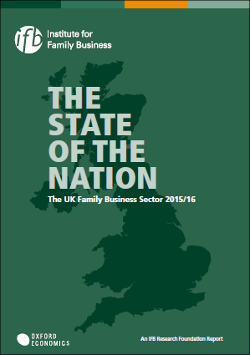Ungated Post | 13 Apr 2016
The State of the Nation: The UK Family Business Sector 2015/16

This report examines the role of family firms in the UK economy. It follows on from previous IFB Research Foundation family business sector reports published in 2008, 2011 and 2014.
The state of family businesses matters because they make up a large proportion of all UK businesses. Across the length and breadth of the country, small-scale, family-run firms produce goods, provide services and create jobs in all sectors of the economy. They vary widely in size, management structure and longevity. They also face a number of challenges, some of which are unique to family firms.
Headline findings include the fact that family businesses employed an estimated 47 per cent of all UK private sector employment and generated 34 per cent of the UK’s private sector turnover in 2014.
Oxford Economics’ team is expert at applying advanced economic tools that provide valuable insights into today’s most pressing business, financial, and policy issues.
To find out more about our capabilities, contact:
Americas
Diantha Redd
+1 (646) 503 3052
Email
Asia Pacific
Peter Suomi
+65 6850 0110
Email
EMEA
Aoife Pearson
+44 (0)203 910 8054
Email
Related Services

Post
The economic impact of abandoning the WTO
Oxford Economics have been commissioned by the International Chamber of Commerce (ICC) to provide an independent assessment of the economic impact of WTO dissolution. This report details our findings and the assumptions underpinning our analysis.
Find Out More
Post
The economic impact of the sports activities of public service media
This study shows how the sports activities of public service media supported €4.5 billion of GDP and 57,000 jobs across 31 European countries in 2022. The report also highlights wider economic benefits of public service media sports coverage, such as the way in which it leverages sponsorship income for sports bodies.
Find Out More
Post
Global Trade Education: The role of private philanthropy
Global trade can amplify economic development and poverty alleviation. Capable leaders are required to put in place enabling conditions for trade, but currently these skills are underprovided in developing countries. For philanthropists, investing in trade leadership talent through graduate-level scholarships is an opportunity to make meaningful contributions that can multiply and sustain global economic development.
Find Out More